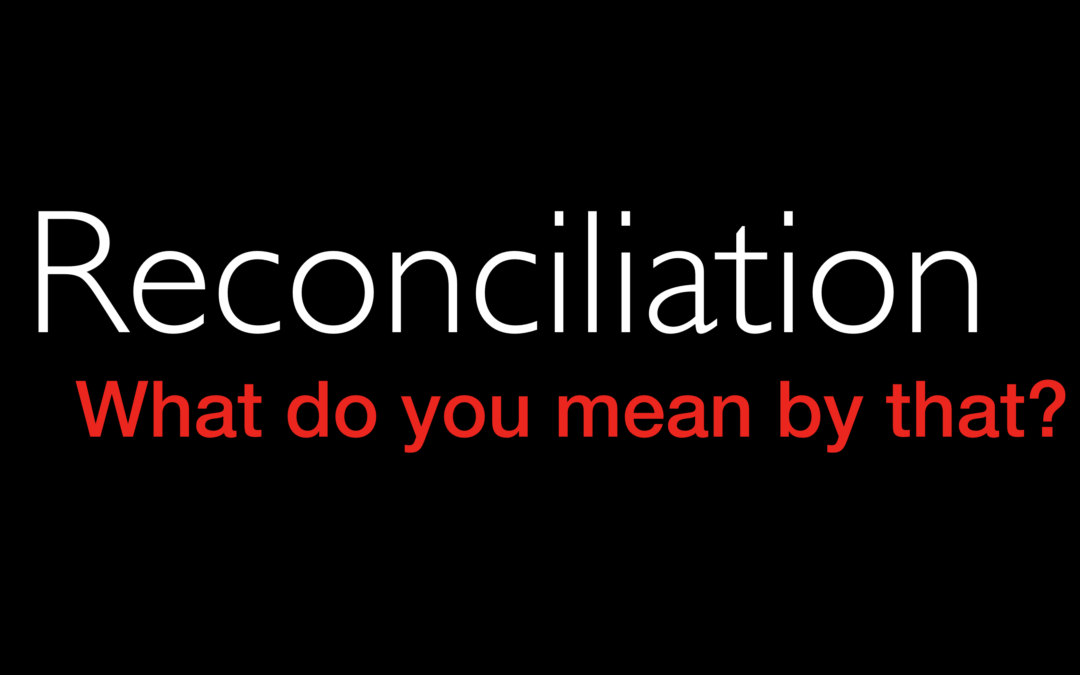The word and concept of ‘Reconciliation’ is getting thrown around quite a bit right now. One must understand that ‘reconciliation’ means different things to different people. That is why it is important to define terms up front in a conversation. The best way to get people to define their terms is to ask the question; “What do you mean by that?”
John Stonestreet likes to say, “People are using the same words but different dictionaries.” In other words, the same word may mean different things to different people. If you are using the same words but different dictionaries, you and the other person are having two completely parallel conversations. You are basically talking about two completely different things. You will reach two completely different conclusions. This is frustrating and a waste of time. Not to mention, it can create conflict or exacerbate tensions.
I’m not going to provide multiple nuanced definitions of ‘reconciliation’ floating around the culture. I intend to focus on the Biblical definition of ‘reconciliation’. By focusing on the real thing, it makes it easier to identify the fakes.
What is Reconciliation?
Reconciliation is defined: katallagē (Gk) – an exchange; restoration to favor (between God and man) – adjustment of a difference, restoration to favor. It is the restored relationship / favor between God and a repentant sinner who places his/her trust in Jesus Christ’s atoning death on the cross and His resurrection.
In terms of western culture, reconciliation is a cultural artifact from a Judeo-Christian heritage. No other worldview offers the concept of reconciliation in the way in which we know it today. Even as we sometimes misunderstand or misapply it, reconciliation is a distinctly biblical concept found in the New Testament in particular.
Many (not all) well-meaning Christ-followers who love the Lord have a disordered concept of ‘reconciliation.’ I confess, I have adopted a disordered view in the past. As Christians, we know that “iron sharpens iron”. Therefore, we must be personally vigilant and point each other back to scripture frequently. Words (and their definitions) matter because they shape reality and give meaning to the world around us.
What is Reconciliation for?
(what is the purpose of reconciliation?)
Lets’ begin at the beginning!
1. In the beginning God created all things including human beings (who were made in His image). God said it was “very good.” Humans lived in perfect harmony with God.
2. The Bible states that because of sin our relationship with God is broken (referred to as ‘The Fall’ in Genesis 3). We are born into sin, under God’s judgement and wrath.
3. Because God is Holy and perfectly good, we cannot restore that relationship on our own. There is nothing we can do – no number of good deeds can save us. We need an outside agent to reconcile us with our Creator. We need a Savior.
4. Jesus Christ took our sin upon himself and died on a Roman cross innocent. When he rose from the grave, Jesus reconciled sinful man to a holy and perfect God. He essentially made a path where one did not exist.
5. When a man or woman believes and trusts in the finished work of Christ, he or she is the reconciled with God – the formerly broken relationship is restored. The Bible refers to this as the ‘new of life’ and the condemnation of sin is removed forever.
Therefore, Biblical Reconciliation is primarily a vertical process and relationship between an individual and God mediated through Jesus Christ. All authentic and redeeming qualities of reconciliation flow from this vertical relationship with God as the source. There is NO other source of reconciliation. God is it.
For instance, if I am not reconciled with God first, there is no way I can be reconciled with anyone else. This is a spiritual reality. Furthermore, the other person must be reconciled with God before he/she can be reconciled with me. Nowhere in the Bible will you find a doctrine that teaches that horizontal reconciliation (man to man) is a viable primary option. It is always vertical (man to God – through Christ).
In the absence or rejection of reconciliation with God, all you have is manmade acquiescence or genuflection to another’s power, coercion or emotion. From a Biblical perspective, I argue this is a counterfeit ‘reconciliation’. Why?
Without Christ, we are totally incapable of Christ-exalting good (John Piper). As Paul says in Romans 7:18, “Nothing good dwells in me, that is, in my flesh.” In John 15:4 Jesus states, “apart from me you can do nothing.”
Every individual Christ-follower is challenged personally with two questions;
1. Do I believe what the Bible says?
2. Am I willing to live as the Bible instructs and commands?
Disclosure: I am guilty of everything I’m about to say because I’m a sinner too. So, the following is a message for me to hear as well.
Well-meaning Christians who love the Lord seem to turn to manmade / man-centered secular concepts of ‘reconciliation’. Why?
First, while the Bible remains the best-selling book in history, the bible is the least read, studied or understood. Basically, well-meaning Christians don’t know their Bibles. Therefore, they misunderstand and misapply the Gospel of the Kingdom to life and culture.
Second, because the Bible is not viewed as sacred scripture and authoritative but more of a “moral manual.” So, people pick and choose what verses they like in order to validate or support their position or sin patterns. When we treat the bible as a cafeteria-style moral manual, we conveniently sidestep hard truths, conviction, repentance and healthy realignment with God’s Word**
Third, while many well-meaning Christians will claim to believe the bible, their worldview betrays their claims. In other words, how we live our lives reveals what we believe. Many Christians today live as secular humanists or functional atheists without realizing it.
Finally, making manmade or man-centered (horizontal) ‘reconciliation’ primary feeds man’s pride and ego. In addition it gives him a psychological escape hatch from sin. This stems from the sinful trait of self-determinism. In my estimation, man-centered reconciliation reveals our idolatry and fear of man rather than a fear of God.
Biblical Reconciliation begins with our realizing and admitting our sin against God
Psalm 51:4 states the following from an individual perspective, Speaking to God the Psalmist cries, “Against you, you only, have I sinned and done what is evil in your sight…” We sin against God first.
Romans 3:23 encompasses ALL humans who ever lived, “for all have sinned and fall short of the glory of God.”
Basically, God has put ALL human beings on notice regarding sin. We are all born in the same sinking ship. Thank God, he sent Jesus to save us.
Does the bible say, “Be reconciled to the world?” Nope, the Bible says the following;
“God was reconciling the world to Himself in Christ, not counting men’s trespasses against them. And He has committed to us the message of reconciliation. Therefore we are ambassadors for Christ, as though God were making His appeal through us. We implore you on behalf of Christ: Be reconciled to God.…”
The Great Commission of Christ’s church is to call the world to be reconciled with God, not to call the world to be reconciled with the world. There will be no reconciling the world to the world without God. That is a biblical impossibility and antithetical to the Gospel.
Jesus summed up the Ten Commandments and 613 Jewish laws in two commands.
“You shall love the Lord your God with all your heart and with all your soul and with all your mind. This is the great and first commandment. And a second is like it: You shall love your neighbor as yourself.” – Matthew 22:37-39
Relationship with God is primary and is the post on which the second hangs. Our message to the world is ‘be reconciled with God!”
In conclusion, it is vitally important to define our terms up front in a conversation. A good way to do that is to ask a question like, what do you mean by that (reconciliation)? As I have pointed out, the Christian must be focused on the primary work of reconciling the lost with God through the death, burial and resurrection of Jesus Christ. We also love our neighbors and even enemies as ourselves (our witness). Biblical reconciliation is quite different from worldly reconciliation… The results are quite different as well.
Live your life the way in which you were saved – by grace through faith in Jesus Christ.
** [Section Note] When a Christ-follower is out of line with God’s Word, it grieves the Holy Spirit. Therefore, the believer feels conviction and frustration. The Holy Spirit ceases working through the believer and begins to bring conviction in order to bring about repentance and realignment with God’s Word. This is why I believe that Christians who dabble in non-biblical versions of reconciliation end up feeling frustrated and confused when the world’s version just simply does not work (ever). Keep at it long enough and it will have a callousing effect on the heart and you risk losing the sensitivity to sin – that can lead to backsliding. Do not grieve the Holy Spirit by following worldly philosophies or patterns of living (see Eph. 4:17-32)
Read previous post: “Is Virtue Signaling Sinful?”
If you like what you read here, please subscribe – sign-up here. Every time I post something new, you will receive an email.




